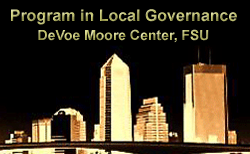Decentralization of policy making among multiple governmental units in federal systems can promote competition and innovation, but it can also lead to inefficiencies as decisions by one governmental unit impose positive and negative externalities on others. The consequences are particularly acute in metropolitan areas, where authority is fragmented among competing local governments and specialized federal, state, and local agencies.
The most commonly advanced solutions to fragmented authority are consolidation and privatization. Between these extremes lies a broad array of institutional forms that coordinate the decisions of units with more modest changes to the authority and activities of existing institutions. Regional, multilateral institutions lie closer to the consolidation end of the spectrum, but differ from consolidation in their more limited policy scope and participation requirements. Bilateral coordination through voluntary agreement lies closer to the market end, although agreements are limited to jointly-preferred exchanges among existing authorities rather than with third-party providers in a market setting.
The empirical case analyses and essays presented at this workshop will build an integrated theoretical perspective to study these voluntary coordinating institutions. The actors in our approach to “institutional collective action” are thus governmental authorities linked vertically or horizontally. Fragmentation of authority defines a first-order problem by creating situations in which the choice of independent agencies leads to outcomes that are seldom efficient and not particularly preferred by any of the agencies. Resolving these first-order problems leads to the second-order collective problem of developing institutions that alter the first-order problem in a manner that improves joint outcomes. We are particularly interested in the “networks” of bilateral exchanges that help develop and maintain coordination efforts. Studies of collective action and transaction costs typically assume institutions are exogenously determined by some statutory authority. Instead we wish to focus on the dynamics by which the institutional structure emerge, identify the forces that generate institutional solutions, and investigate how changes in problem definition might induce changes in institutions and in policy outcomes.
The workshop seeks a broad discussion about the role of informal institutions in resolving institutional collective action. We will bring together researchers reporting on empirical studies as well as leading scholars in political science charged with critiquing the empirical studies and contributing essays that place these ideas in the context of broader literatures dealing with issues of fragmentation. The papers will be published in an edited volume on the role of informal institutions in coordinating fragmented formal authority, with an emphasis on policies relating to the provision of urban services, and management of water and other natural resources.



